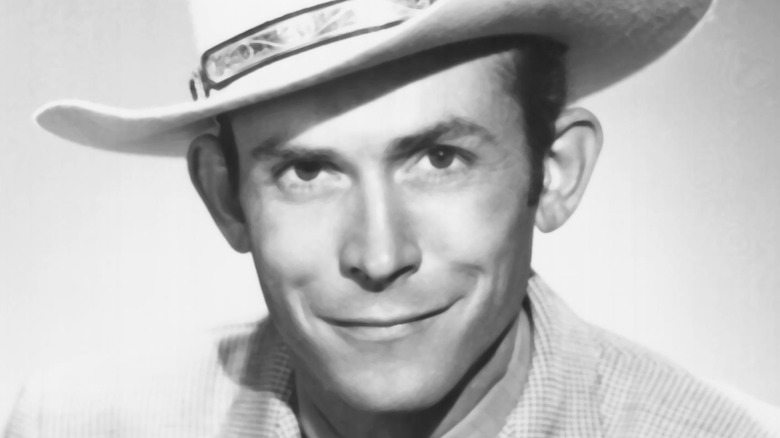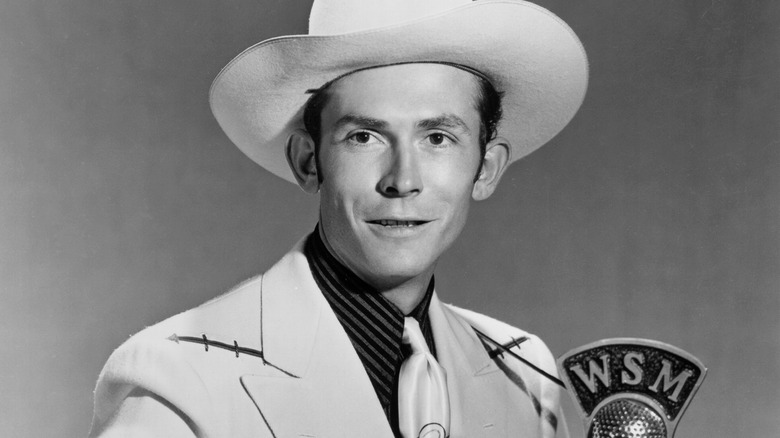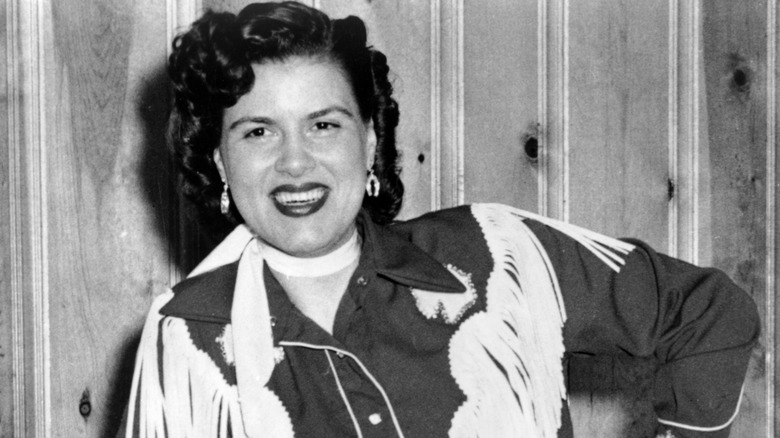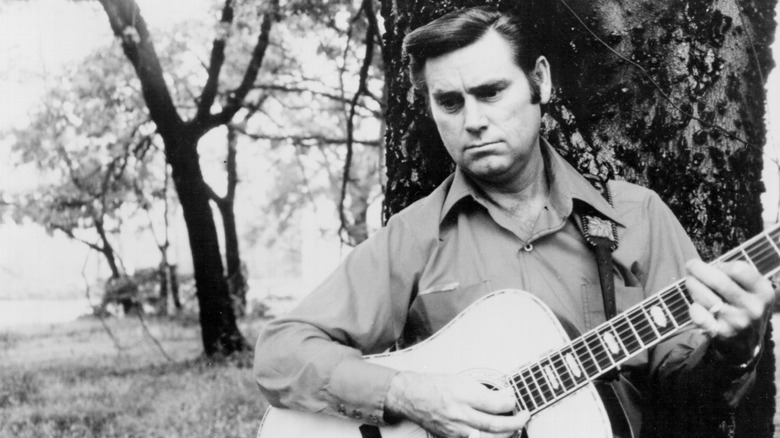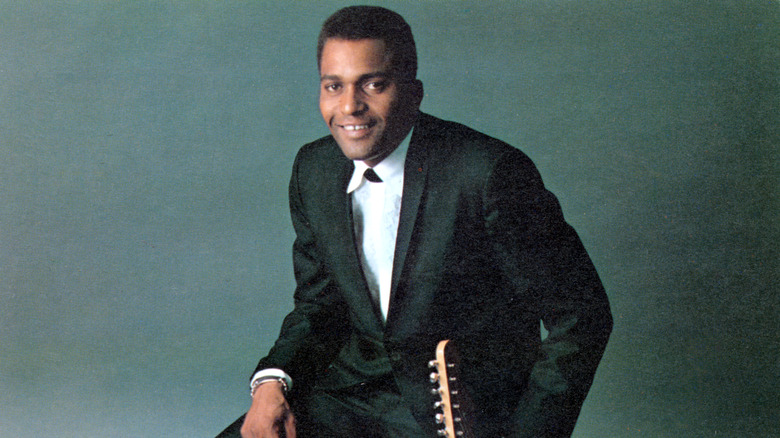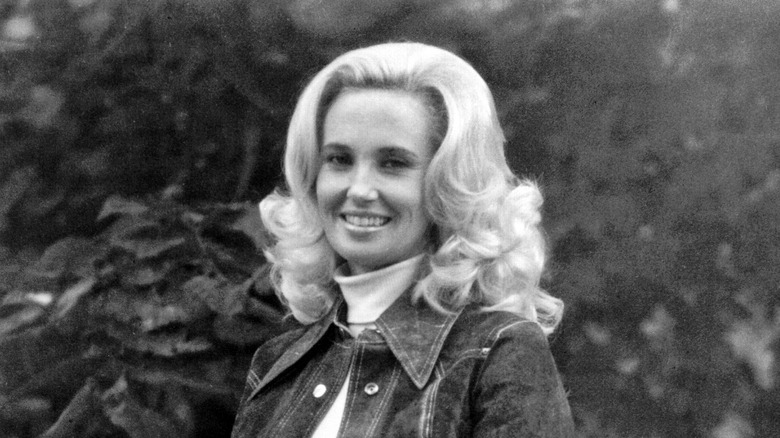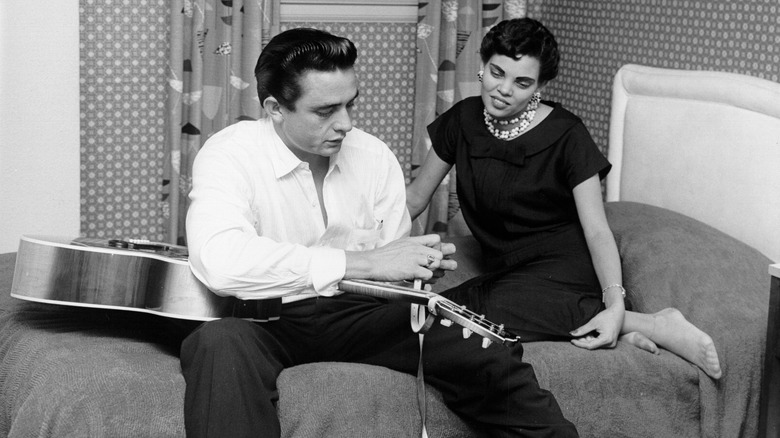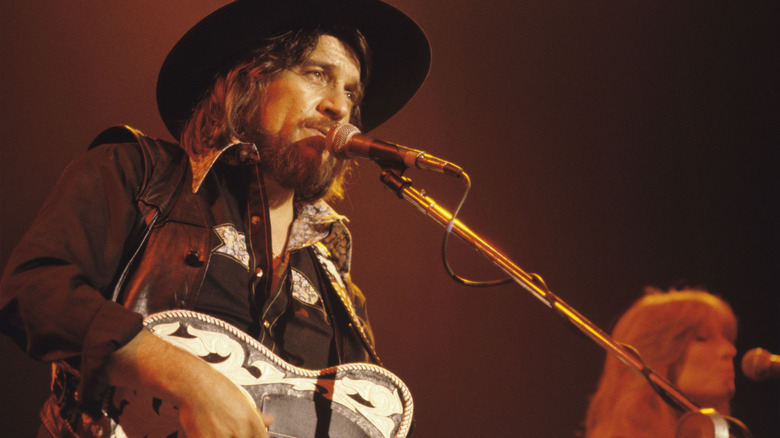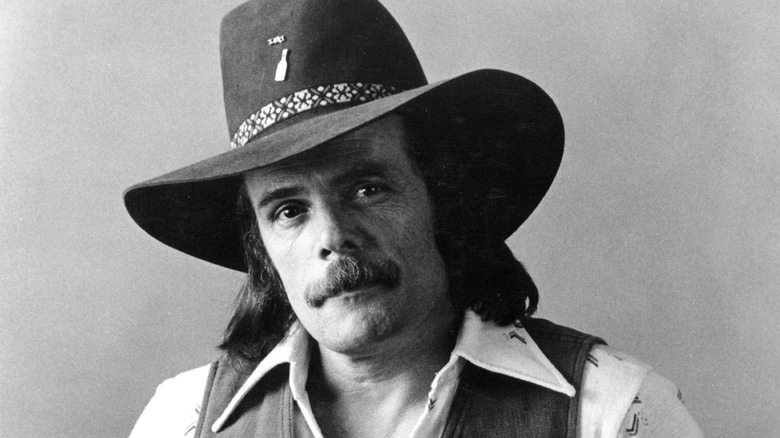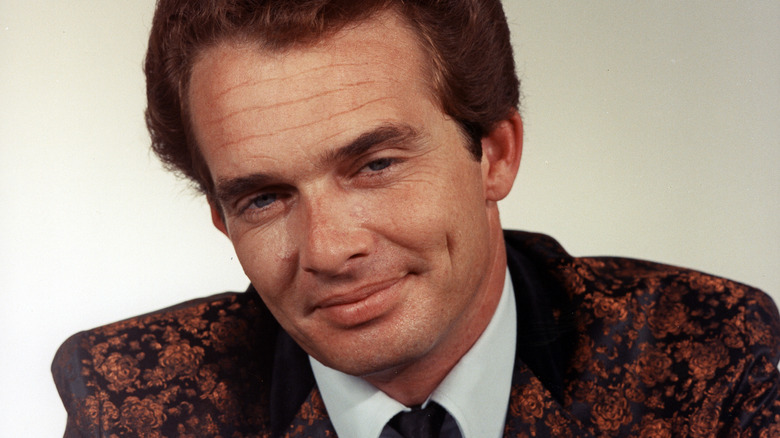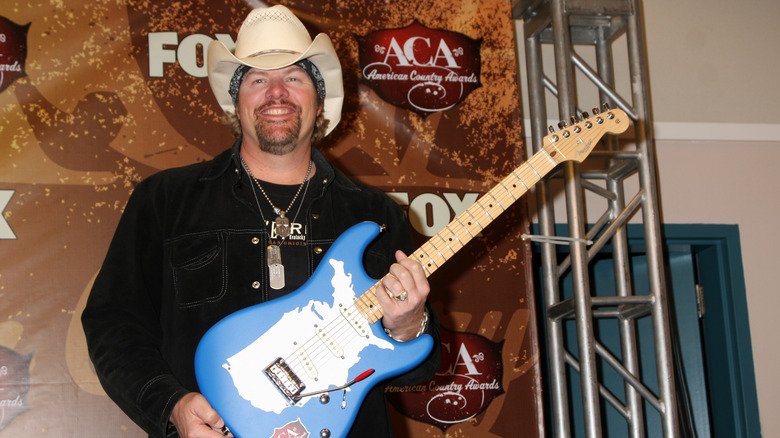Tragic Details About Classic Country Musicians
When you think of classic country stars, singers from the '50s through the '80s typically come to mind, such as Hank Williams and Johnny Cash. However, there are several more recent stars whose work also fits the genre, including Toby Keith and Randy Travis. Classic country music is still showcased on radio stations throughout America even with the proliferation of modern country artists, many of whom incorporate a more rock-style influence in their music.
Many classic country music stars have entertained fans with their hit songs over the years, but quite a few of them also had to cope with personal and professional issues. Some struggled with drug and alcohol abuse, while others broke the law and served time in prison. A few were abused by their spouses, and some died way too young at the peak of their careers. Here are the tragic details of some of classic country's most popular stars.
Hank Williams had severe addiction issues and died young
Hank Williams was a popular country star in the '40s and '50s with hits including "Cold, Cold Heart," "Your Cheatin' Heart," "Hey, Good Lookin'," and "I'll Never Get Out of This World Alive." As a child, his family didn't have a lot of money, and he struggled with the health condition spina bifida. His singing and songwriting career started taking off in the early 1940s, but his chronic back pain led to alcohol abuse. It wasn't uncommon for him to perform drunk onstage, according to Biography.
Despite battling alcoholism, Williams' career soared after the release of the 1949 song "Lovesick Blues." The more successful he got, the more he drank, and he also started abusing morphine. Eventually, he was fired by the Grand Ole Opry, gained 30 pounds, started losing his hair, and had a minor heart attack. On Dec. 30, 1952, the singer fell unconscious in a hotel room, yet a doctor allowed him to keep working. A few days later on New Year's Eve, he had a heart attack in his Cadillac and died. Williams was just 29 years old. Despite his short-lived career, he made a huge impact on the country music community. In 1961, Williams was inducted into the Country Music Hall of Fame, and he was given a special citation by the Pulitzer Board in 2010 for songwriting.
If you or anyone you know is struggling with addiction issues, help is available. Visit the Substance Abuse and Mental Health Services Administration website or contact SAMHSA's National Helpline at 1-800-662-HELP (4357).
Patsy Cline was killed in a plane crash at age 30
Born during the Depression, Patsy Cline, born Virginia Patterson Hensley, was abused by her father as a child. After he abandoned everyone, Cline dropped out of high school to help support her family. She became passionate about music at an early age, according to the Country Music Hall of Fame and Museum. She married Gerald Cline in 1953, but the couple divorced four years later. She then married Charlie Dick in 1957 and gave birth to a daughter in 1958.
At that point in her career, her biggest hit was "Walkin' After Midnight," which peaked at No. 2 on the country charts and No. 12 on the pop charts. She had a son in 1961 and released hit songs such as "Pieces," "Crazy," and "She's Got You." In September 1962, Cline, who the year prior had survived a terrible car crash, told friends Loretta Lynn, Dottie West, and June Carter that she had premonitions of her own death. After performing in Kansas City on March 3, 1964, she died in a plane crash alongside the pilot and Opry stars Cowboy Copas and Hawkshaw Hawkins. She was just 30 years old. In 1973, Cline was inducted into the Country Music Hall of Fame, the first sole female artist to be awarded the honor.
If you or someone you know may be the victim of child abuse, please contact the Childhelp National Child Abuse Hotline at 1-800-4-A-Child (1-800-422-4453) or contact their live chat services.
George Jones had numerous issues
George Jones was one of eight children and grew up poor in Texas. He wrote in his autobiography "I Lived to Tell It All" that his father was an alcoholic: "We were our daddy's loved ones when he was sober, his prisoners when he was drunk" (via Biography). His father gave him his first guitar when he was just eight years old, and in 1950, Jones had a short-lived marriage that dissolved because of his inherited penchant for drinking and his uncontrollable anger.
Jones became an established star in the early 1960s with hits such as "White Lighting" and "Tender Years." Meanwhile, substance abuse led to his split with his second wife. In 1969, he married fellow singer Tammy Wynette, but they divorced in 1975. At this point, Jones was a mess, and he would disappear for days, missing concert dates and recording sessions. He also started abusing cocaine, which led to significant weight loss. This was followed by a drunk driving arrest and other issues with the law. In 1983, he was malnourished and losing his mind and "ended up in a straightjacket at Hillcrest Psychiatric Hospital," according to Texas Monthly. He stopped drinking for several years after marrying Nancy Sepulveda, but a relapse in the '90s led to a car accident. He later claimed the crash finally stopped him from drinking.
In 2012, Jones received a Grammy Lifetime Achievement Award, and he died the following year at age 81 after a successful 50-year career.
If you or anyone you know is struggling with addiction issues, help is available. Visit the Substance Abuse and Mental Health Services Administration website or contact SAMHSA's National Helpline at 1-800-662-HELP (4357).
Charley Pride, country music's first Black superstar, died of COVID-19
Charley Pride made his mark as a country music star from the '60s through the '80s with songs such as "Is Anybody Goin' to San Antone", "Kiss an Angel Good Mornin'", and "All I Have to Offer You Is Me". His father was a sharecropper, and Pride picked cotton to save money for his first guitar, according to the Country Music Hall of Fame and Museum. He was the 1971 CMA Entertainer of the Year and received CMA's Willie Nelson Lifetime Achievement Award in 2020.
On December 12, 2020, Pride, 86, died of complications from COVID-19, according to Taste of Country. He was admitted to the hospital in late November and passed away a couple weeks later. His death devastated the country music community. Reba McEntire praised his "great music, wonderful personality and his big heart," while Brad Paisley labeled him "the most generous, kind, trailblazing man." Dolly Parton called him one of her "dearest and oldest friends," and the Oak Ridge Boys said he was a "long time friend, pioneer, hero and LEGEND."
Tammy Wynette lied about an abduction to cover up spousal abuse
Tammy Wynette was shopping with her eight-year-old daughter on October 4, 1978, when she claimed that she kidnapped from a parking lot in Nashville, Tennessee. The singer reported that an armed, masked man was in the backseat of her vehicle and ordered her to drive. He proceeded to strangle her with pantyhose and punched her before abandoning her in a town 80 miles away, according to The Boot. Wynette told People later that month, "It was the most terrifying experience of my life," and she had suffered a fractured cheekbone and several bruises.
During the investigation, the police had trouble determining a motive and were confused because the incident did not involve sexual assault. Also, Wynette's cash and credit cards weren't stolen. Over 20 years later, her daughter, Jackie Daly, revealed in a book that her mother made the incident up to hide the abuse she received from her fifth husband, George Richey, allegations he denied. Tamala Georgette backed up her sister's claims that Richey had beat up their mother. Georgette wrote in her 2011 memoir, "He threatened to destroy her life and write a tell-all book so she decided to stay with him ... so he concocted the kidnapping story for PR" (via The Boot).
If you or someone you know is dealing with domestic abuse, you can call the National Domestic Violence Hotline at 1−800−799−7233. You can also find more information, resources, and support at their website.
Johnny Cash's first wife received death threats for being African-American
Johnny Cash met Vivian Liberto in 1951 when she was just 17 years old. The pair married in 1954 after he was discharged from the military and set up a home in Memphis, Tennessee. Over the years, the couple had four children: Cindy Cash, Rosanne Cash, Kathy Cash, and Tara Cash, according to Country Thang Daily. In 1956, Cash released "I Walk The Line," which sold 2 million copies and hit No. 1 on the country charts, catapulting his career. The family moved to California, and Cash spent a lot of time on the road touring and spending time with singer June Carter, according to Biography.
Cash's alcohol and drug abuse and his extramarital affairs led to the dissolution of his and Vivian's marriage. In 1965, after Cash was arrested for drug use, a newspaper used a photo of him with Vivian, shocking some people who didn't realize his wife was African-American. Many fans were upset by the revelations, and concerts were cancelled. Cash was also accused of fraternizing with Black sex workers. Newspapers focused on the color of Vivian's skin, and she received death threats from groups such as the Ku Klux Klan. After their divorce in 1966, Vivian remarried two years later, and she later wrote a book about her marriage to Cash.
If you or a loved one has experienced a hate crime, contact the VictimConnect Hotline by phone at 1-855-4-VICTIM or by chat for more information or assistance in locating services to help. If you or a loved one are in immediate danger, call 911.
Waylon Jennings nearly died in the plane crash that killed Buddy Holly
In 1959, Waylon Jennings was the bass player in Buddy Holly's backing band during the "Winter Dance Party" music tour, which took place in the midwestern states. Jennings was supposed to fly to a venue on February 3 but instead he gave his seat to J.P. "Big Bopper" Richardson, who wasn't feeling well, according to the Southwest Times Record. The winter weather had caused problems throughout the tour, and Holly joked with Jennings that he hoped his tour bus broke down. Jennings joked back, "I hope your ol' plane crashes." The plane did crash, and Holly, Jennings, and Ritchie Valens were killed.
In 1999, Jennings opened up about his fear that someone would find out that he had joked about the plane crash. He blamed himself and had survivor's guilt. "I hadn't contributed anything to the world at that time compared to Buddy," he told CMT (via the Times Record). "Why would he die and not me? It took a long time to figure that out, and it brought about some big changes in my life — the way I thought about things."
Jennings, known for his outlaw country music, was popular in the '70s and '80s, and Holly had a sweet spot in his heart because he was the first person who had confidence in Jennings' abilities: "He really liked me and believed in me." Jennings died in 2002.
Willie Nelson's first wife beat him when he was drunk
Willie Nelson has produced some of country's most beloved songs, including "Crazy" and "On the Road Again." Popular since the 1960s, the octogenarian is still touring. In 1952, before his music career kicked off, he married 16-year-old Martha Matthews. He told People magazine in 1980, "She was a full-blooded Cherokee, and every night with us was like Custer's last stand." During their marriage, Willie made money from various jobs while playing music at night. When they moved with their kids to Nashville in 1960, their relationship was on the rocks.
By this point, Willie was drinking a lot and even tried to kill himself by lying down in the street and waiting for a car to run him over. Martha intervened. But she got so fed up with his drinking that when he passed out drunk one night, she sewed him inside a sheet. Willie recalled, "Then she got a broomstick and started beating the hell out of me. I woke up in this straitjacket, getting pounded like a short-order steak." When he was able to escape, Martha had left with both the kids and Willie's clothes. That was the end of their marriage.
Nelson was married to Shirley Collie from 1963 to 1971, and he tied the knot with Connie Koepke before divorcing her in 1988. He married Annie D'Angelo in 1991, and they are still together three decades later, according to Media Entertainment Arts Worldwide.
If you or someone you know is dealing with domestic abuse, you can call the National Domestic Violence Hotline at 1−800−799−7233. You can also find more information, resources, and support at their website.
Johnny Paycheck spent several years in prison
Outlaw country singer Johnny Paycheck was known for songs such as "(Pardon Me) I've Got Someone to Kill,” "I Drop More Than I Drink,” and "Take This Job and Shove It." He was a troublemaker from an early age and, while serving in the Navy, received an 18-year sentence for assaulting his superior officer. He was released in 1959 after serving just two years, according the New York Times. He had a few hits in the '60s and '70s but was forced to file for bankruptcy in 1973.
Paycheck was charged with assault of a 12-year-old girl in the '80s, a charge the singer denied but said was related to a drug deal. In 1985, he shot a man at a bar in Ohio and served a couple of years in prison. At that point, he was a born-again Christian, and he swore off drugs and alcohol. Despite his troubles with the law, the country music community never gave up on Paycheck, and he was even inducted into the Country Music Hall of Fame in 1997. He died in 2003 at the age of 64.
Merle Haggard spent time in San Quentin
Merle Haggard was responsible for a string of hits during his career, including "Today I Started Loving You Again," "Old Man from the Mountain," "Workin' Man Blues," and "I Think I'll Just Stay Here and Drink." He was raised by his mother after his father died, and he proceeded to run away from home and spend time in reform school. In 1957, he was sent to San Quentin for burglary. After his release in 1960, he started playing bass in Las Vegas, according to the Country Music Hall of Fame and Museum. Over the course of his career, he was involved in over 150 albums, including soundtracks, reissues, and compilations.
Unfortunately, in 2008, a fire at the Universal Studios backlot resulted in the loss of master tapes from Haggard and a variety of other country music stars, according to Taste of Country. Over 500,000 song titles were decimated, including those by Haggard, Patsy Cline, Loretta Lynne, Lynyrd Skynyrd, George Strait, George Jones, Buddy Holly, and Don Henley. The fire was described as the loss of "a huge musical heritage."
Toby Keith's father died in a terrible car crash
In March 2001, T.K. Covel, Toby Keith's father, died in a car accident that could have been prevented. Covel was driving his truck in Goldsby, Oklahoma, when another vehicle bumped into him. Covel's truck went over the median, and a charter bus struck him, causing his death. Keith and his family filed a lawsuit for wrongful death and negligence and received a $2.8 million settlement, according to Country Standard Time. The blame for the accident was placed on Rodriguez Transportes of Tulsa and the Republic Western Insurance Company.
The Rodriguezes bought the bus in October 2000, and during an inspection the following month in Tulsa, inspectors determined that it "urgently" needed brake work. If the bus had been properly serviced and the driver properly trained to operate the vehicle, Covel would have survived, according to expert testimony in court. David Perez, the driver, did not have a commercial driver's license, and the jury determined that the crash was "clearly avoidable." It decided that Covel was not at fault for the accident, and Rodriguez Transportes behaved in "reckless disregard." Keith said after the trial, "We were only there to find the truth and the jury saw it so plainly that they awarded us a unanimous decision."
Randy Travis suffered a massive stroke
In 2012, a drunken Randy Travis crashed his car in Tioga, Texas. What made matters worse was that he was naked, he threatened to shoot the police officers, and he said he hoped that they got cancer. In addition, the entire incident was caught on video. Travis pleaded guilty, received probation, and spent several years trying to block the release of the video. However, a judge allowed its release in 2017, according to Yahoo Entertainment. In a bid to save Travis' reputation, a rep explained in a statement that the country star was impaired and coping with mental health issues, which caused him to "do and say things that were entirely out of character." The rep also noted that Travis felt "deeply apologetic for his actions."
In 2013, Travis, then 54, suffered a massive stroke. At one point, he was put on life support, and doctors told his wife he had a 1% chance of survival, according to Everyday Health. He survived, and the couple started The Randy Travis Foundation to aid victims of stroke and cardiovascular diseases. In 2016, during his induction into the Country Music Hall of Fame, he was even able to sing some lyrics to "Amazing Grace."
If you or someone you know is struggling with mental health, please contact the Crisis Text Line by texting HOME to 741741, call the National Alliance on Mental Illness helpline at 1-800-950-NAMI (6264), or visit the National Institute of Mental Health website.
